 |
Twin Peaks
Episode 20:
"Checkmate"
TV episode
Written by Harley Peyton
Directed by Todd Holland
Original air date: January 19, 1991 |
Major Briggs is questioned about his
disappearance; Dick and Andy investigate little Nicky’s past;
Nadine puts the moves on Mike; Ben plays war games; Cooper is
deputized.
Read the episode
transcript at Glastonberry.net
Didja Know?
For the titles of the Twin Peaks TV episodes, I have taken
the unique approach of using both the episode numbers, which were
the only titles given the scripts by series creators David Lynch and
Mark Frost, and the translated German titles of the episodes that
were assigned when the series aired in that country. Frequent
readers of PopApostle know I like the aesthetic of actual episode
titles, but I also wanted to honor the simple numbering used by
Lynch and Frost, hence the expanded titles presented in these
studies.
Characters appearing or mentioned in this episode
Dale Cooper
Major Briggs
Dr. Hayward
Sheriff Truman
Colonel Riley (mentioned only)
Ernie Niles
Agent Bryson
Jean Renault
Lucy Moran
Deputy Andy
Dick Tremayne
Windom Earle (mentioned only)
Norma Jennings
Ed Hurley
Shelly Johnson
Leo Johnson
Bobby Briggs
Chet (on Invitation to Love, heard only)
Jade (on Invitation to Love, heard only)
James Hurley
Evelyn Marsh
Jeffrey Marsh (heard only)
Malcolm Sloan
Nadine Hurley (née Butler)
Mike Nelson
Hank Jennings
Josie Packard
Catherine Martell
Samantha
Audrey Horne
Ben Horne
Jerry Horne (mentioned only)
Deputy Hawk
Nails, Nestor, and Netherbey (mentioned only, orphans at Dorritt
Home for Boys)
The Brunstons
Donnie (mentioned only, orphan at Dorritt Home for Boys)
Woody (an alias applied to Andy by Dick)
Donna Hayward
Preston King
Notes from the Log Lady intros
When cable channel
Bravo
obtained the rights to air reruns of Twin Peaks
in 1993, David Lynch directed all-new introductions to each
episode featuring the Log Lady, portrayed by original
actress Catherine E. Coulson. These intros also appear as
options on the DVD and Blu-ray collections of the series.
"My husband died in a fire. No one can know my sorrow.
My love is
gone. Yet, I feel him near me. Sometimes I can almost see
him. At
night when the wind blows, I think of what he might have
been. Again
I wonder: why?
"When I see a fire, I feel my anger rising. This was not a
friendly
fire. This was not a forest fire. It was a fire in the
woods.
This is all I am permitted to say."
Didja Notice?
This episode opens on Friday, March 17, 1989. March 17 is
St. Patrick's Day in Ireland and most of Great Britain's
territories and former colonies. According to
Twin Peaks: An Access Guide to the
Town, the Caribou Festival is held instead in
Twin Peaks:
|
A robust and spirited event to
which people from miles around flock, all dressed from head
to toe in the fur of dead animals.
Roaming the town shortly after the
bars open, bands of roisterers compete for the most accurate
imitation of the caribou mating call. The contest is
unofficial; the winner is usually determined by a fist
fight. Beer and ale flow, jokes are ribald and Sheriff
Truman cancels all leave for his deputies.
|
However, there is no indication in this episode that such a
celebration is occurring.
Dr. Hayward uses a
Polaroid
camera to take photograph of the tattoo found behind Major
Briggs' ear. Polaroid is the company
that introduced instant film to the camera community in 1948
and the photos taken on this film were often referred to as
Polaroid prints or just Polaroids. The Polaroid company has
not manufactured instant film since 2008 due to falling
sales as a result of the popularity of digital cameras.
As he tries to recall information regarding what happened to
him after his abduction in the woods (in
Episode 17:
"Dispute Between Brothers"),
Major Briggs tells Dr. Hayward that his memories are immune
to regression techniques.
Major Briggs remarks that Project Blue Book, the Air Force's
investigation into unidentified flying objects (UFOs) was
officially disbanded in 1969. Project
Blue Book was an actual U.S. Air Force investigation of
unexplained aerial phenomena from 1952-1970, ending with the
claim that most UFOs were misidentifications of conventional
craft or natural phenomena and that the few remaining unexplained
sightings did not constitute a threat to national security.
Briggs goes on to say that some personnel have continued the
study in an unofficial (read "covert") capacity. We see this
born out in
The Secret
History of Twin Peaks.
Two Air Force MPs arrive at the sheriff's station to take
Major Briggs for debriefing at the command of Colonel Riley.
Riley was seen investigating Briggs' disappearance in
Episode 19:
"The Black Widow".
After Briggs is taken away from the sheriff's station by the
MPs, Cooper picks up the
Polaroid
photo of the triangular marks found behind the major's ear and drops of
water begin to fall on the photo from the fire sprinkler in
the ceiling. Is this an indication of "fire" present, as in
a spiritual force connected to the White or Black Lodge?
At 5:39 on the Blu-ray, notice that the donut on top of the
stack next to the telephone in Truman's office has a bite
taken out of it. Shortly after this, Cooper walks in and
picks up the donut and discards it with a look at Ernie,
implying Ernie took a bite and set it back down on the
stack!
The sweater Ernie wears has a zig-zag pattern in the gray
areas, looking like a representation of jagged peaks.

Truman's office has undergone a temporary redecoration for
some reason in this episode. The couch under the window is
gone, the picture of
President Truman is missing, and the deer's head labeled
"The Buck Stopped Here" that is normally hanging from the
wall is now sitting on its side on top of the file cabinets!
The deer head is later seen set next to the corpse left by
Windom Earle in Truman's office...I guess Earle figured he
should make use of it in his new display.
An ad for Metro
Ford is
seen in the newspaper being read by Lucy at 7:30 on the
Blu-ray.
Lucy's sweater has small triangular designs that could be
seen as peaks. Also present are a couple of star-like
designs.
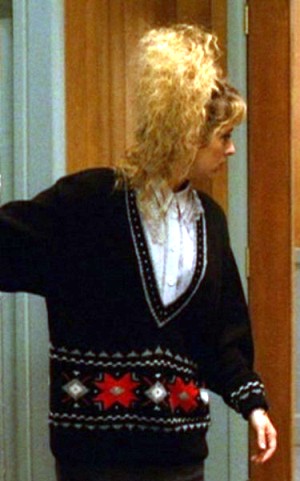
The school bus that drives past the RR Diner at 8:14 on the
Blu-Ray is for Snoqualmie Valley School District. The town
of North Bend, WA, where the exteriors of the RR were shot
(the Mar T Cafe at the time), is within the boundaries of
the Snoqualmie Valley School District. (Notice that the "RR"
sign is also missing from above the "Cafe" sign in this
shot!)
| At 9:14 on the Blu-ray, a sign in the RR advertises one
of its specials, called, appropriately enough, the "Double
R", featuring two eggs, two strips of bacon, two sausage
links, and two slices of toast for just two dollars. |
 |
It is often said that no episodes of Invitation to Love
appeared in the second season of Twin Peaks, but
that's not strictly true. As Shelly tries to feed Leo and
Bobby makes a jerk of himself, the opening theme of
Invitation to Love can be heard playing on Shelly's TV
and even some lines of dialog between two of the characters
(may be Chet and Jade).
At 9:29 on the Blu-ray, notice that numerous jars of what
appears to be
Gerber baby food are seen sitting on the kitchen table
in Shelly's house. It seems likely that these are what
Shelly and Bobby are feeding to the incapacitated Leo.
During his phone call with Ed, James tells him that the bar
called Wallie's is on 96. There is a short State Route 96 in
Washington, but it is located in the western part of the
state near the Seattle area, not "a couple hours" out from
the Twin Peaks region in the east.
James tells Evelyn that after two girls he knew got
murdered, he just wanted to get on his bike and ride away.
He told Maddy he sometimes feels like he should just take
off on his bike and ride away in
Episode 10:
"The Man Behind Glass".
At 15:12 on the Blu-ray, the day's Stockpot Soup at the RR
is spring wheat and barley.
The woman Audrey calls Sam, who Ben chases out of his
office, is his secretary Samantha, last seen in
Episode 17:
"Dispute Between Brothers".
Notice that she is carrying a ketchup bottle along with her
drum and papers, probably used as fake blood on the bandanna
around her head.
This episode begins a brief subplot is which Ben Horne
thinks he's General Robert E. Lee fighting the U.S. Civil
War alongside such Confederate stalwarts as General Jeb
Stuart. Robert E. Lee was a
Confederate general and commander of the Confederate Army,
who unconditionally surrendered to U.S. forces at Appomattox
Courthouse, VA in 1865, ending the U.S. Civil War. J. E. B.
Stuart was one of Lee's generals. In the following episodes,
Ben thinks Jerry is General Stuart.
As Audrey enters her father's office, he's playing with
miniature Civil War figures on a miniature battlefield
landscape he's built there, and he's commanding someone to
lead the charge up Little Round Top. Little Round Top is a
small, rocky hill that was a pivotal battle of the larger
Battle of Gettysburg on July 2, 1863.
Ernie explains to Hawk that he suffers from hyperhydrosis,
causing his nervous perspiration. Hyperhydrosis is an actual
medical condition.
With Cooper temporarily suspended from the FBI, Truman makes
Cooper a deputy of the Twin Peaks sheriff's department in
this episode. His badge number is 13.
Trying to back out of the drug deal setup he's in on with
Cooper and Truman, Ernie pleads that he's just a CPA. CPA
stands for Certified Public Accountant.
This episode reveals that little Nicky lives at the Dorritt
Home for Boys. Most likely, the "Dorritt" name comes
from the 1857 Charles Dickens novel Little Doritt
and the title character, a girl who grows up as the daughter
of a man in London's debtors' prison.
| In the child placement office of the
Dorritt Home for Boys, notice there is a bumper sticker or
something on one of the file cabinets that says
"CHILDPOWER!" There is also a copy of
Mad
magazine sitting on the coffee table; it appears to be issue
#299, December 1990, with Bart Simpson on the cover. |
 |
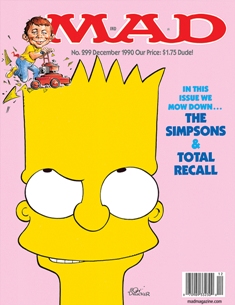 |
This episode reveals that little Nicky's last name is
Needleman. As Dick fingers through the office's alphabetized
file folders to find Nicky's, he rattles off the other names
he passes, Nails, Nestor, and Netherbey.
At 25:02 on the Blu-ray, notice that Big Ed's belt has "Big
Ed" etched into the leather!
During the fight in the Hurley home, notice that there are
figurines and small statues sitting on various shelves and
tables besides just the ones frequently seen on the five shelves
near the foyer. Nadine must be an obsessive collector of
them.
As Nadine shoves Hank up against the wall and then throws
him through the figurine shelves into the foyer, notice that
a cat painting falls off the wall as Nadine shoves him
against it, but it's hanging there again a split second
later as she throws him.
At 28:50 on the Blu-ray, Ben remarks on the defeat of
Colonel Lawrence at Little Round Top and accepts the
surrender of General Meade (Bobby Briggs). Both Lawrence and
Meade were involved on the Union side during the battle at
Little Round Top. But, Ben has altered history in depicting
them as the losers in that battle. Bobby tells him he has to
go talk to President Lincoln before getting back to him on
this whole surrender thing. Lincoln, of course, was the U.S.
President during the Civil War.
At 29:07 on the Blu-ray, notice that Ben's photo of Laura
Palmer is resting in the antlers of his golden elk statue.
At 32:41 on the Blu-ray, Evelyn refers to James as "Jim" and
he says, "Don't call me Jim." Does he have a problem with
being called "Jim"? I once thought that maybe "Jim" was the
name of his father and he doesn't like it because his father
has not been around. But
The Secret
History of Twin Peaks reveals that James'
father was named Billy Hurley.
As James unveils the repaired Jaguar to Evelyn at 32:57 on
the Blu-ray, notice that his motorcycle is parked in front of
the garage in the background.
At 34:07 on the Blu-ray, the champagne bottle James had set down
on the car seat is suddenly gone!
| At 35:41 on the Blu-ray, notice that some
windows at the Dead Dog Farm house appear to be painted over
with a peace symbol and some other colorful, strange images.
There is also a peace symbol and what may be "No War"
graffiti-painted on the wall inside the house at 39:04. |
 |
 |
Jean Renault tells Cooper that when he (Cooper) arrived, the
simple life of Twin Peaks ended, the dream ended, bringing a
nightmare that resulted in the deaths of his brothers, drug
dealers Bernard and Jacques Renault. But that is really only
a nightmare from Jean's point of view. It could be that
Cooper's arrival is signaling the end of a nightmare, with
the deaths of several bad guys.
Agent Bryson wears what appears to be a RR Diner waitress
uniform to bring food to Jean Renault and Preston King. Was
Norma brought into the know on the siege at Dead Dog Farm
and she agreed to lend a uniform and food to the law
enforcement effort?
It seems highly unlikely that any law enforcement group
would allow an actual waitress to bring food to holed up
suspects under any circumstances and Mountie King and Jean
Renault should know that; King and Renault should not have
fallen for the ruse.
The food platters Agent Bryson brings in appear to have the
Meals on Wheels stickers on the heat covers!
The gun Cooper pulls from Agent Bryson's garter is a
Walther PPK.
Why is Shelly sleeping on the couch instead of her bed? Is
it because she has to keep an eye on Leo in his convalescent
bed in the living room?
At 44:00 on the Blu-ray, there is a Chinese take-out
container on Shelly's kitchen table.
When Shelly discovers Leo conscious and on his feet in the
kitchen, why is his face smeared with food and why is he
wearing a party hat? Was she toying with him while she fed
him that evening? Or did he do it to himself to let her know
he remembered how she and Bobby treated him while he was
"brain dead" and convalescing? When the scene picks up again
in the next episode, the smeared food is gone! It seems the
shot must have been borrowed from
Episode 13:
"Demons", when
Shelly and Bobby had Leo's welcome home party.
Notice that the corpse left by Windom Earle in Truman's
office appears to have one clouded-over eye and one green
eye. Why? In Fire Walk With Me, a photo of Teresa
Banks looks as if it depicts her with one green eye (the
right) and one blue (the left).
The man portraying the corpse at the end of this episode
is Craig MacLachlan, brother of Kyle MacLachlan (Cooper), and a
production assistant on Twin Peaks.
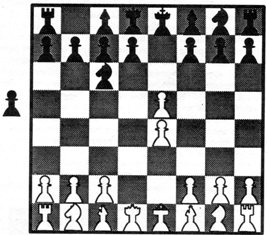 |
Earle's chess move at the end of the episode is PxP
(Pawn takes Pawn). This would be considered the appropriate
move to make as the board currently sits. The chess board
set up in Truman's office in front of the corpse does not
actually match the game in progress at all! Why would Earle
have left it set up that way? It's never explained (or even
remarked upon!). Presumably, Cooper simply surmises Earle's
move from the fact that the dead man has a Pawn in his mouth
and he knows Earle had a white Pawn in a position to take
his black Pawn. (See "Patterns and Conflicts: An Analysis of
the Windom Earle/Dale Cooper Chess Game", Wrapped in
Plastic #4, April 1993, which includes input from chess
expert John Jacobs, former chess columnist of the Dallas
Times Herald. Diagram is from that article.) |
Unanswered Questions
Whose voice is it that is heard whispering "Cooper" at the
beginning of the episode? Presumably, it is a being
associated with the White Lodge.
The mark of three triangles that are found
behind Major Briggs' right ear is similar to the emblem for
signs indicating a fallout shelter in the United States. Is
there any intentional relation?
When I worked at a comic book store called Four Color Fantasies
during the initial run of Twin Peaks, I made the
acquaintance of artist and graphic desinger Larry Hunt
when he came in looking for Peaks-related material
and I turned him on to the TP fanzine Wrapped in Plastic,
to which he subsequently contributed some art, including the
third image below, "Briggs's Tattoo Interpretation"...a
symbolic representation of a flying owl. |
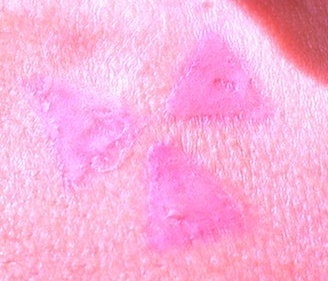 |
 |
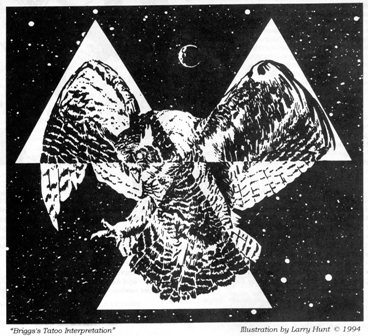 |
| Triangular marks behind Major Briggs' ear |
Fallout shelter sign (by Ericmetro, from
Wikipedia) |
"Briggs's Tattoo Interpretation" by Larry
Hunt (from Wrapped in Plastic #9) |
This episode is the last we see of Dead Dog Farm (though it
is mentioned in passing in a couple of later episodes). Is
Cooper still interested in the place? Will we find him
living there in the new Showtime series when it debuts? Of
note is the fact that the actual house used as Dead Dog Farm
(in Sylmar, CA) was torn down around 2002 (see Brad Dukes'
account of his visit to the site at
braddstudios.com).
Memorable Dialog
Cooper.wav
a giant
owl.wav
are you familiar with Project Blue Book?.wav
unidentified flying objects.wav
the
Earth below.wav
we are searching for a place called the White Lodge.wav
little Donnie is dead.wav
kiss me, General Lee.wav
the
nightmare.wav
Back to Twin Peaks
Episode Studies